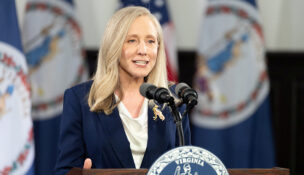Boundary quandary
Gary Robertson //January 21, 2018//
The San Andreas Fault is an earthquake-producing formation that runs for 750 miles through California, producing often devastating shocks.
Does Virginia's form of local government have its own systemic San Andreas Fault, quietly waiting for a cataclysmic reckoning at some future date?
That was the primary question tackled by a panel of local government authorities speaking Friday at a Virginia Bar Association conference.
The meeting took place was in Williamsburg, where Virginia's system of local government had its colonial roots.
“We are prisoners of our history to some extent,” former Gov. Gerald L. Baliles said, striking an ominous tone about the current state of local government operations.
Baliles, who took a lead role in the discussion, said that in Virginia's earliest days, and for many years afterward, local government rested in the formation of counties whose boundaries were created by a simple rule.
“The courthouse had to be within a day's ride on horseback within any point in the county,” he said.
Today, the former governor explained, Virginia's counties and independent cities operate different systems of government, often with different laws and local priorities.
When regional problems arise – such as opioid addiction, transportation snarls or inequitable public education – Virginia's form of local government creates barriers to possible solutions.
“If we have regional problems, we got to have a regional approach. That requires us to consider boundary changes, which is a hard-rock political problem,” Baliles said.
By boundary changes, he was speaking of the boundaries between Virginia's 95 counties and the 38 independent cities – a rare form of local government division.
James D. Campbell, former executive director of the Virginia Association of Counties, enumerated a long list of commissions and advisory councils whose work often resulted in recommendations for improving regional cooperation.
Those recommendations, he observed, were often consigned to the dust bin.
“We create some of these regional efforts or cooperative incentives [that} should be funded through the General Assembly. But often that funding disappears. And, the regional efforts lose their momentum,” Campbell said.
R. Michael Amyx, retired executive director of the Virginia Municipal League, said the latest regional initiative is GO Virginia, a program described as an effort “to restore Virginia's position of economic leadership by growing and diversifying the state's economy.”
Amyx said the program tries to match job skills by each region, where the economic development opportunities often differ.
Robert C. Bobb, CEO of the Robert Bobb Group, a financial turnaround and management firm working with local governments, most recently in Petersburg, warned that Virginia is losing some its financial clout as a result of an outmigration of residents in recent years.
Bobb, a former Richmond city manager, said that Virginians are moving to states further south – such as North Carolina and Georgia.
Research indicates that the exodus has been prompted by retirees, as well as those looking for better employment opportunities. But most important, people are moving to lower their overall cost of living.
“They are less expensive to reside in than in Virginia,” Bobb said, speaking of metropolitan areas such as Atlanta and Charlotte, N.C.
Following, their formal presentations Bobb, Campbell and Amyx responded to a question from Virginia Business: “If you could change one thing about local government, what would it be?” Their answers can be seen below.
i


















